- Home
- Salman Rushdie
Step Across This Line: Collected Nonfiction 1992-2002 Page 4
Step Across This Line: Collected Nonfiction 1992-2002 Read online
Page 4
“Where is Vaudeville?” Somewhere on the way to the Wizard, apparently. The Scarecrow and the Tin Man are both pure products of the burlesque theater, specializing in pantomime exaggerations of voice and movements, pratfalls (the Scarecrow descending from his post), improbable leanings beyond the center of gravity (the Tin Man during his little dance) and, of course, the smart-ass backchat of the cross-talk act:
TIN MAN, rusted solid: (Squawks)
DOROTHY: He said “oil can”!
SCARECROW: Oil can what?
At the pinnacle of all this clowning is that comic masterpiece, Bert Lahr’s Cowardly Lion, all elongated vowel sounds (Put ’em uuuuuuup), ridiculous rhymes (rhinoceros / imposserous), transparent bravado, and operatic, tail-tugging, blubbing terror. All three, Scarecrow, Tin Man, and Lion, are, in Eliot’s phrase, hollow men. The Scarecrow actually does have a “headpiece filled with straw, alas”; but the Tin Man is no less empty—he even bangs on his chest to prove that his innards are missing, because “the Tinsmith,” his shadowy maker, forgot to provide a heart. The Lion lacks the most leonine of qualities, lamenting:
What makes the Hottentot so hot,
What puts the ape in apricot,
What have they got that I ain’t got?
Courage!
Perhaps it’s because they are hollow that our imaginations can occupy them so easily. That is to say, it is their anti-heroism, their apparent lack of Great Qualities, that makes them our size, or even smaller, so that we can stand among them as equals, like Dorothy among the Munchkins. Gradually, however, we discover that along with their “straight man,” Dorothy (who plays, in this part of the film, the part of the unfunny Marx Brother, the one who could sing and look hunky and do little else), they embody one of the film’s “messages”—that we already possess what we seek most fervently. The Scarecrow regularly comes up with bright ideas, which he offers with self-deprecating disclaimers. The Tin Man can weep with grief long before the Wizard gives him a heart. And Dorothy’s capture by the Witch brings out the Lion’s courage, though he pleads with his friends to “talk me out of it.”
For this message to have its full impact, however, we must learn the futility of looking for solutions outside ourselves. We must learn about one more hollow man: the Wizard of Oz himself. Just as the Tinsmith was a flawed maker of Tin Men—just as, in this secular movie, the Tin Man’s god is dead—so too must our belief in Wizards perish, so that we may believe in ourselves. We must survive the Deadly Poppy Field, helped by a mysterious snowfall (why does snow overcome the poppies’ poison?), and so arrive, accompanied by heavenly choirs, at the city gates.
Here the film changes convention once again. Now it’s about hicks from the sticks arriving at the metropolis, one of the classic themes of American cinema, with echoes in Mr. Deeds Goes to Town, or even in Clark Kent from Smallville’s arrival at the Daily Planet in Superman. Dorothy is a country bumpkin, “Dorothy the small and meek”; her companions are backwoods buffoons. Yet—this too is a familiar Hollywood trope—it is the out-of-towners, the country mice, who will save the day.
There never was a metropolis quite like the Emerald City. It looks from the outside like a fairy tale of New York, a thicket of skyscraping green towers. Inside its walls, though, it’s the very essence of quaintness. It is startling that the citizens—many of them played by Frank Morgan, who adds the parts of the gatekeeper, the driver of the horse-drawn buggy, and the palace guard to those of Professor Marvel and the Wizard—speak with English accents that rival Dick Van Dyke’s immortal cockney in Mary Poppins. Tyke yer anyplace in the city, we does, says the coachman, adding, I’ll tyke yer to a place where you can tidy up a bit, what? Other members of the citizenry are dressed like Grand Hotel bellhops and glitzy nuns, and they say, or rather sing, things like Jolly good fun! Dorothy catches on quickly. At the Wash and Brush Up, a tribute to urban technological genius that has none of the dark doubts of a Modern Times or City Lights, our heroine even gets a little English herself:
DOROTHY (sings): Can you even dye my
eyes to match my gown?
ATTENDANTS (in unison): Uh-huh!
DOROTHY: Jolly old town!
Most of the citizens are cheerful and friendly, and those that appear not to be—the gatekeeper, the palace guard—are quickly won over. (In this respect, once again, they are untypical city folk.) Our four friends gain entry to the Wizard’s palace because Dorothy’s tears of frustration un-dam a quite alarming reservoir of liquid in the guard, whose face is soon sodden with tears, and as you watch this Niagara you are struck by the number of occasions on which people cry in this film. Apart from Dorothy and the guard, there is the Cowardly Lion, who cries when Dorothy bops him on the nose; the Tin Man, who almost rusts up again from weeping; and Dorothy again, captured by the Witch. (If the Witch had been closer at hand on one of these occasions and gotten herself wet, the movie might have been much shorter.)
So: into the palace we go, down an arched corridor that looks like an elongated version of the Looney Tunes logo, and at last we confront a Wizard whose illusions—giant heads, flashes of fire—conceal, but only for a while, his essential kinship with Dorothy. He, too, is an immigrant in Oz; indeed, as he will later reveal, he is a Kansas man himself. (In the novel, he came from Omaha.) These two immigrants, Dorothy and the Wizard, have adopted opposite strategies of survival in the new, strange land. Dorothy has been unfailingly polite, careful, courteously “small and meek,” whereas the Wizard has been fire and smoke, bravado and bombast, and has hustled his way to the top—floated there, so to speak, on a current of his own hot air. But Dorothy learns that meekness isn’t enough, and the Wizard—as his balloon gets the better of him for a second time—that his command of hot air isn’t all it should be. It’s hard for a migrant like myself not to see in these shifting destinies a parable of the migrant condition.
The Wizard’s stipulation, that he will grant no wishes until the four friends have brought him the Witch’s broomstick, ushers in the penultimate and least challenging (though most action-packed and “exciting”) movement of the film, which is, in this phase, at once a buddy movie, a straightforward adventure yarn, and, after Dorothy’s capture, a more or less conventional princess rescue story. After the great dramatic climax of the confrontation with the Wizard of Oz, the film sags for a while and doesn’t really regain momentum until the equally climactic final struggle with the Wicked Witch of the West, ending with her melting, her “growing down” into nothingness. The relative dullness of this sequence has something to do with the script’s inability to make much of the Winged Monkeys, who remain ciphers throughout, whereas they could have been used (for example) to show us what the oppressed Munchkins might have been like under the power of the Witch of the East, before their liberation by Dorothy’s falling house.
(One interesting detail. When the Witch dispatches the Winged Monkeys to capture Dorothy, she speaks a line that makes no sense at all. Assuring the chief Monkey that his prey will give him no trouble, the Witch explains, I’ve sent a little insect on ahead to take the fight out of them. But, as we cut down to the forest, we learn nothing further about this insect. It’s simply not in the film. It was, though. The line of dialogue is left over from an earlier version of the film, and it refers to a ghost of the discarded musical sequence I mentioned earlier. The “little insect” was once a fully fledged song that took over a month to film. He is the Jitter Bug.)
Fast-forward. The Witch is gone. The Wizard has been unmasked and, in the moment after his unveiling, has succeeded in a spot of true magic, giving Dorothy’s companions the gifts they did not believe they possessed until that instant. The Wizard has gone, too, and without Dorothy, their plans having been fouled up by (who else but) Toto. And here’s Glinda, telling Dorothy she has to learn the meaning of the ruby slippers for herself . . .
GLINDA: What have you learned?
DOROTHY: If I ever go looking for my heart’s desire again, I won’t look further than my own back
yard. And if it isn’t there, I never really lost it to begin with. Is that right?
GLINDA: That’s all it is. And now those magic slippers will take you home in two seconds. Close your eyes . . . click your heels together three times . . . and think to yourself . . . there’s no place like . . .
Hold it. Hold it.
How does it come about, at the close of this radical and enabling film, which teaches us in the least didactic way possible to build on what we have, to make the best of ourselves, that we are given this conservative little homily? Are we to believe that Dorothy has learned no more on her journey than that she didn’t need to make such a journey in the first place? Must we accept that she now accepts the limitations of her home life, and agrees that the things she doesn’t have there are no loss to her? “Is that right?” Well, excuse me, Glinda, but it isn’t.
Home again in black-and-white, with Auntie Em and Uncle Henry and the rude mechanicals clustered round her bed, Dorothy begins her second revolt, fighting not only against the patronizing dismissals of her own folk but also against the scriptwriters, and the sentimental moralizing of the entire Hollywood studio system. It wasn’t a dream, it was a place, she cries piteously. A real, truly live place! Doesn’t anyone believe me?
Many, many people did believe her. Frank Baum’s readers believed her, and their interest in Oz led him to write thirteen further Oz books, admittedly of diminishing quality; the series was continued, even more feebly, by other hands after his death. Dorothy, ignoring the “lessons” of the ruby slippers, went back to Oz, in spite of the efforts of Kansas folk, including Auntie Em and Uncle Henry, to have her dreams brainwashed out of her (see the terrifying electroconvulsive therapy sequence in the Disney film Return to Oz); and, in the sixth book of the series, she took Auntie Em and Uncle Henry with her, and they all settled down in Oz, where Dorothy became a princess.
So Oz finally became home; the imagined world became the actual world, as it does for us all, because the truth is that once we have left our childhood places and started out to make up our own lives, armed only with what we have and are, we understand that the real secret of the ruby slippers is not that “there’s no place like home” but rather that there is no longer any such place as home: except, of course, for the home we make, or the homes that are made for us, in Oz, which is anywhere, and everywhere, except the place from which we began.
In the place from which I began, after all, I watched the film from the child’s—Dorothy’s—point of view. I experienced, with her, the frustration of being brushed aside by Uncle Henry and Auntie Em, busy with their dull grown-up counting. Like all adults, they couldn’t focus on what was really important to Dorothy: namely, the threat to Toto. I ran away with Dorothy and then ran back. Even the shock of discovering that the Wizard was a humbug was a shock I felt as a child, a shock to the child’s faith in adults. Perhaps, too, I felt something deeper, something I couldn’t articulate; perhaps some half-formed suspicion about grown-ups was being confirmed.
Now, as I look at the movie again, I have become the fallible adult. Now I am a member of the tribe of imperfect parents who cannot listen to their children’s voices. I, who no longer have a father, have become a father instead, and now it is my fate to be unable to satisfy the longings of a child. This is the last and most terrible lesson of the film: that there is one final, unexpected rite of passage. In the end, ceasing to be children, we all become magicians without magic, exposed conjurers, with only our simple humanity to get us through.
We are the humbugs now.
April 1992
The Best of Young
British Novelists
[In 1983, the following twenty writers were chosen as the “Best of Young British Novelists”: Martin Amis, Pat Barker, Julian Barnes, Ursula Bentley, William Boyd, Buchi Emecheta, Maggie Gee, Kazuo Ishiguro, Alan Judd, Ian McEwan, Adam Mars-Jones, Shiva Naipaul, Philip Norman, Christopher Priest, Salman Rushdie, Clive Sinclair, Lisa St. Aubin de Teran, Graham Swift, Rose Tremain, and A. N. Wilson. Notable omissions included Bruce Chatwin and Timothy Mo.
Ten years later, I helped make the second such selection. Our final list was as follows: Iain Banks, Louis de Bernières, Anne Billson, Tibor Fischer, Esther Freud, Alan Hollinghurst, Kazuo Ishiguro, A. L. Kennedy, Philip Kerr, Hanif Kureishi, Adam Lively, Candia McWilliam, Adam Mars-Jones, Lawrence Norfolk, Ben Okri, Caryl Phillips, Will Self, Nicholas Shakespeare, Helen Simpson, and Jeanette Winterson.]
On Friday, January 8, 1993, Bill Buford, the editor of Granta, rang the Sunday Times to announce the names of the twenty writers selected for the second Best of Young British Novelists promotion. Like the other judges—the novelist and critic A. S. Byatt, John Mitchinson of Waterstone’s, and myself—he was in a state of some excitement. We were all proud of the list, and felt sure that readers would be as delighted as we had been to discover so many vivid, confident, and ambitious new writers. The smart book-world chatter about this “generation” says that it’s no good. How pleasant, we thought, to be able to disprove that proposition.
On Sunday, January 10, the Sunday Times—which had assured us of its support for the promotion, and had therefore been given the exclusive right to publish the list—ran a piece by its acting literary editor, Harry Ritchie, which was about as supportive as a fatwa. *5 It compared the list unfavorably to the first Best of Young British list in 1983. It suggested that the publicity “may backfire by revealing the absence of literary talent.” It quoted such reliable sneerers as Julie Burchill and Kingsley Amis saying that the list was “crap,” and it tried to twist Martin Amis’s neutral remarks into another attack. It was a poisonously ungenerous article from someone whose very job ought to depend on his love of writing and his willingness to champion the best of the new. Ritchie, when confronted, admitted to me that he had no knowledge of the work of half the writers on the list.
The comparison with 1983 isn’t fair unless one is reminded of the point those writers had reached at that time. In the summer of 1983, Martin Amis hadn’t published Money, London Fields, or Time’s Arrow. Ian McEwan hadn’t published The Child in Time, The Innocent, or Black Dogs. Julian Barnes hadn’t published Flaubert’s Parrot, A History of the World in 101⁄2 Chapters, or The Porcupine. William Boyd hadn’t published his “breakthrough novel,” The New Confessions; Rose Tremain hadn’t published Restoration; Graham Swift hadn’t published Waterland; Adam Mars-Jones had written just one collection of short stories; Kazuo Ishiguro had not yet published either An Artist of the Floating World or the Booker-winning The Remains of the Day. Pat Barker’s best work was still to come, as were the novels of Clive Sinclair.
These were, in short, highly promising writers with some achievements and a great future ahead of them—exactly like the 1993 group. The earlier group contained one Booker winner; the new one contains two, as well as numerous winners of Somerset Maugham, John Llewellyn Rhys, Trask, and Whitbread prizes. Virtually none of the 1983 group had built up a large, loyal readership, though some were beginning to do so; of the 1993 group, Iain Banks, Kazuo Ishiguro, Ben Okri, Jeanette Winterson, Philip Kerr—an innovative thriller writer I’d never previously read—and Hanif Kureishi have legions of fans.
It is true that some of the names on our list will be unknown to most readers. These include some of the best and most exciting writers on the list. It seems to me astonishing that a writer with the narrative drive and comic brio of Louis de Bernières is so little known, especially as he has won a Commonwealth literature prize. Another surprise package is Tibor Fischer, whose Trask-winning first novel, Under the Frog, is a delicate seriocomic treasure, a novel about Hungary in 1956—Fischer is of Hungarian parentage—seen through the eyes of a basketball team traveling the country in the nude. Esther Freud’s much-praised first novel, Hideous Kinky, also earned her a well-deserved place on this list.
Two writers I hadn’t read before amazed me with their ambition, erudition, and skill. Lawrence Norfolk’s Lemprière’s Dictionary is a dazzling linguistic and
formal achievement that takes on a rich and under-explored subject: the East India Company. (There are countless Raj fictions but few imaginings of the earlier period of Company rule.) It reminded me at times of the Dutch masterpiece of colonial trade, Multatuli’s Max Havelaar. And Adam Lively’s monster-novel of a dystopic future, Sing the Body Electric, is as rich and complex a novel of ideas as one could wish for.
To see so diverse a list dumped on by people who simply haven’t read the books is to feel a kind of despair about the culture of denigration in which we live. Can’t we be fair-minded enough to give these books, these writers, a chance? Can’t we even let them have their fifteen minutes in the spotlight before we start trashing them?
The list’s critics say that by forty, writers should have some solid triumphs under their belts. How about The Remains of the Day, The Wasp Factory, The Swimming-Pool Library, The Buddha of Suburbia, The Famished Road, The Passion? They say the young writers on the list don’t merit attention. But Fischer, Freud, and Nicholas Shakespeare have been acclaimed and won prizes; Will Self is already a cult figure.
True, some of these twenty writers are only just arriving at publication: for example, A. L. Kennedy, a writer rich in the humanity and warmth that seems at a premium in these bleak times, and well able to handle a layered narrative and build to a shocking climax that is fully earned and not a bit gratuitous.
It is a tribute to the strength of the list that so many highly rated writers—Adam Thorpe, Robert McLiam Wilson, Rose Boyt, Lesley Glaister, Robert Harris, Alexander Stuart, D. J. Taylor, Richard Rayner, David Profumo, Sean French, Jonathan Coe, Mark Lawson, Glenn Patterson, Deborah Levy—didn’t make it. I personally regret not having been able to find room for such talented first-time writers as Tim Pears, whose beautiful first novel, In the Place of Fallen Leaves, brings just a touch of Macondo to rural Devon in the heat wave of 1984; Nadeem Aslam, whose novel of modern Karachi, Season of the Rainbirds, is much better than its title; and Romesh Gunesekera, whose first story-collection, Monkfish Moon, gives notice of a fine writer in the making.

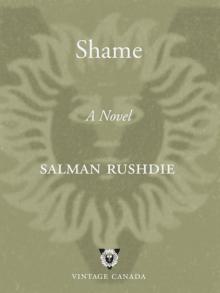 Shame
Shame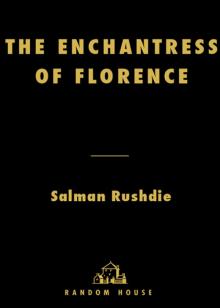 The Enchantress of Florence
The Enchantress of Florence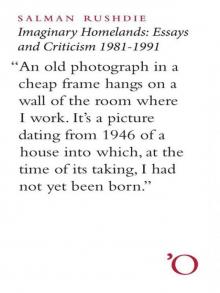 Imaginary Homelands: Essays and Criticism 1981-1991
Imaginary Homelands: Essays and Criticism 1981-1991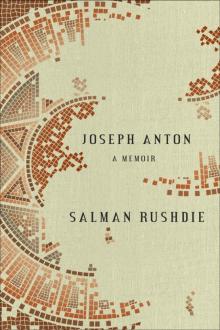 Joseph Anton: A Memoir
Joseph Anton: A Memoir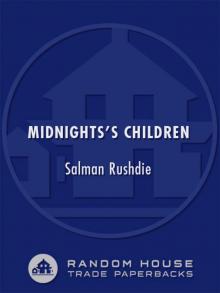 Midnight's Children
Midnight's Children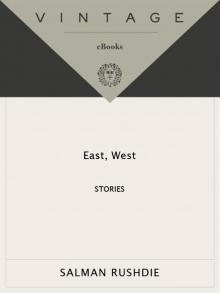 East, West: Stories
East, West: Stories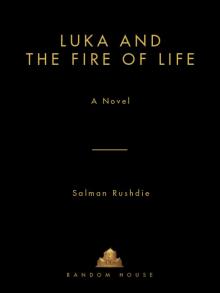 Luka and the Fire of Life
Luka and the Fire of Life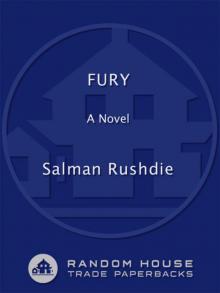 Fury Fury Fury
Fury Fury Fury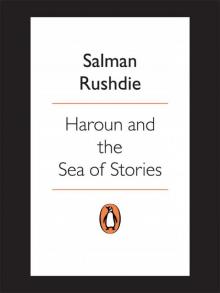 Haroun and the Sea of Stories
Haroun and the Sea of Stories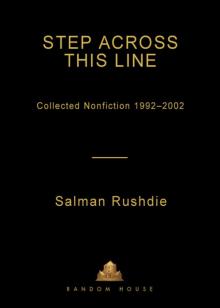 Step Across This Line: Collected Nonfiction 1992-2002
Step Across This Line: Collected Nonfiction 1992-2002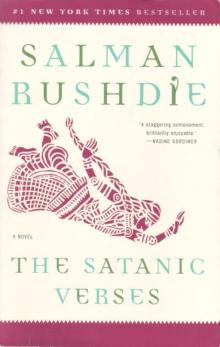 The Satanic Verses
The Satanic Verses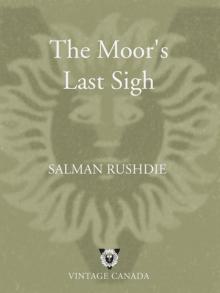 The Moor's Last Sigh
The Moor's Last Sigh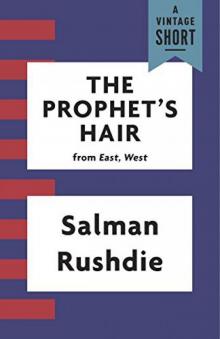 The Prophet's Hair
The Prophet's Hair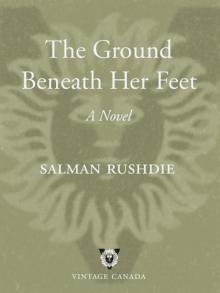 The Ground Beneath Her Feet
The Ground Beneath Her Feet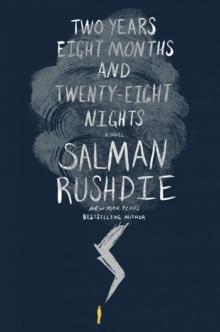 Two Years Eight Months and Twenty-Eight Nights
Two Years Eight Months and Twenty-Eight Nights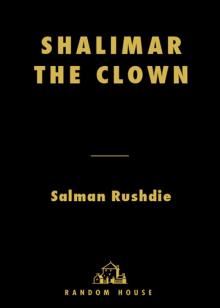 Shalimar the Clown
Shalimar the Clown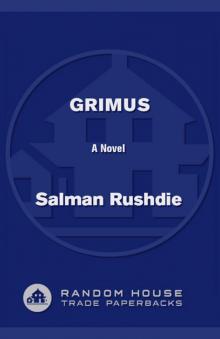 Grimus
Grimus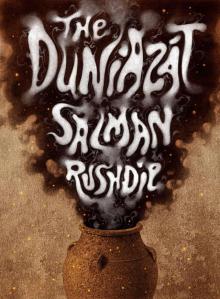 The Duniazát
The Duniazát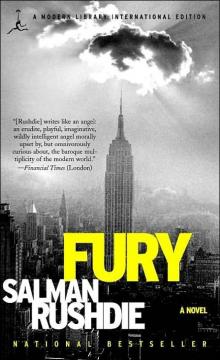 Fury
Fury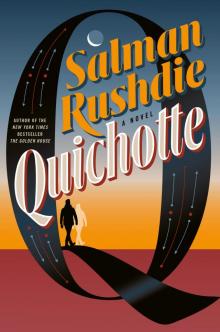 Quichotte
Quichotte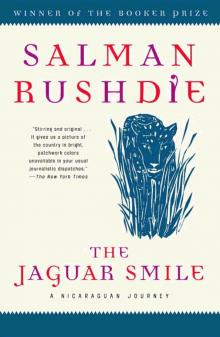 The Jaguar Smile
The Jaguar Smile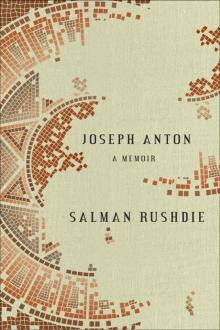 Joseph Anton
Joseph Anton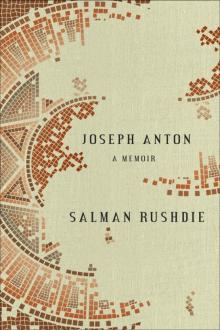 Joseph Anton: A Memoir: A Memoir
Joseph Anton: A Memoir: A Memoir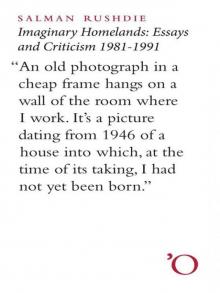 Imaginary Homelands
Imaginary Homelands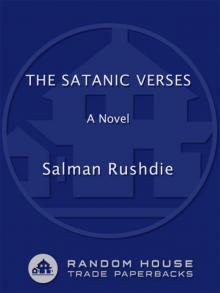 The Satanic Verses: A Novel
The Satanic Verses: A Novel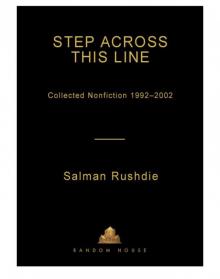 Step Across This Line
Step Across This Line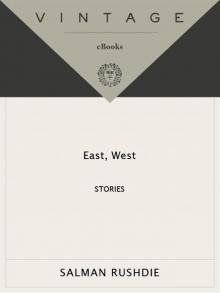 East, West
East, West